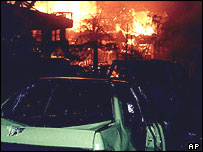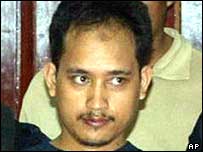
The attackers decided to target 'soft' targets like clubs
|
The major suspects in the Bali bombing case appear to tie together South-East Asia's most murky Islamic militants.
One of those expected on trial, Mukhlas, is believed to be the new operations chief for the regional Islamic militant group Jemaah Islamiah (JI).
Mukhlas is said by police to have admitted to taking part in meetings in July and August in Java at which the targets of the 12 October Bali attack were chosen.
Another key suspect, Imam Samudra, is said by police to have not only confessed to masterminding the Bali attack, but to playing a role in church bombings across Indonesia in the last two years.
He denies any links with JI , but the church attacks appear to link him to Abu Bakar Ba'asyir, the alleged spiritual leader of JI, and to Hambali, one of the region's most wanted men.
And Amrozi, the first person to go on trial in connection with the Bali attack, studied in Malaysia under Imam Samudra, and his older brother, Mukhlas.
Intricate web
The head of the Indonesian investigation into the Bali bombing, General I Made Mangku Pastika, has said that Mukhlas took over from Hambali as JI's chief of operations. Mukhlas has admitted belonging to the group.
Jemaah Islamiah is thought to want to overthrow governments in the region and replace them with a pan-South East Asian Islamic state.
Some analysts warn, however, that it is not clear how far JI is a structured organisation, or whether it is a loose affiliation of like-minded people, many of whom have no interest in terrorism.
It is not clear what role, if any, Imam Samudra or Amrozi play in JI.
But Imam Samudra's admission to not only masterminding the Bali plot, but to taking part in a string of attacks on churches across Indonesia in 2000, would appear to link him to alleged JI leader Mr Ba'asyir, who is on trial for his suspected involvement in the same church attacks.
In 2000, Imam Samudra is said to have targeted Batam island off Singapore as part of a string of Christmas Eve bombings which left 19 dead.
The 35-year-old computer specialist has also admitted to being involved in an attack on a shopping mall in Jakarta in 2001.
Mr Ba'asyir, a preacher best known for his fiery attacks on America and Israel, is on trial charged with plotting to overthrow the Jakarta government and turn Indonesia into an Islamic state.
The charges relate principally to the church bombings.
Police and intelligence officers have also indicated that they suspect Mr Ba'asyir of involvement in the Bali attacks, but Zainari Lubis, a spokesman for the Bali investigation, said in January that the cleric cannot be charged on this front until he has been tried for treason.
Mr Ba'asyir denies any involvement in terrorist acts, and denies that JI even exists.
Malaysia roots
It appears that many of the people being linked to the Bali bombings came together at the same Islamic school in Malaysia, where many radical Muslims fled in the early 1990s to dodge former Indonesian dictator Suharto's suppression.
The BBC's Jonathan Kent in Kuala Lumpur says it is not surprising that the group came and went unnoticed.
He says they would have arrived alongside hundreds of thousands of Indonesians in search of work, legally and illegally, and the human traffic was such that it would have been impossible to track them.
Imam Samudra, Mukhlas and Abu Bakar Ba'asyir are all said to have taught at the Luqmanul Hakiem school in Johor, southern Malaysia.
While there, police say Imam Samudra befriended Amrozi.

Imam Samudra first met other Bali suspects in Malaysia
|
Idris, an ethnic Malay who police have also named as a suspect in the Bali attack, and is thought to have been its fund raiser, also attended the school.
One of the leaders at the school is said to have been Riduan Isamuddin, also known as Hambali. He is dubbed by the CIA as the "Osama Bin Laden of South-East Asia" and is another alleged leader of JI.
Police say that Imam Samudra has admitted, under interrogation since his arrest, to having met Hambali in Malaysia.
Hambali is wanted by several countries in the region in connection with a string of bomb attacks in the last two years, including the Indonesian church attacks and a plot to blow up the US embassy in Singapore in December 2001.
Hambali is also the only member of the group who is known to have met members of Bin Laden's al-Qaeda network.
He is alleged to have arranged a meeting of two of the 11 September hijackers with other al-Qaeda figures in Malaysia in January 2000.
The hijackers allegedly met at the apartment of Yazid Sufaat, a former Malaysian army captain who studied under Hambali, according to Mr Sufaat's lawyer.
Zacarias Moussaoui, who is on trial in the US over the 11 September attacks, was also a business contact of Hambali's, according to the Indonesian's wife.
Bali preparation
These al-Qaeda links could have helped in the preparation for the Bali attack.
Hambali is reported to have arranged for Imam Samudra and others to train in al-Qaeda camps in Afghanistan.
The Indonesian police say that Imam Samudra spent two and a half years in Afghanistan, where he learned to build bombs.
Police say he then returned to Indonesia in 2000, and reunited with Amrozi.
It was only a few months later that churches across Indonesia were bombed. The raids at the time were widely blamed on Islamic militants.
The next piece in the jigsaw appears to have been a plot to blow up the US embassy in Singapore.
This was discovered and foiled in December 2001. According to Western intelligence and media reports, the plotters were members of JI.
The head of the Indonesian investigation into the Bali bombing, General Pastika, has said Imam Samudra was involved in the plan, as have Western diplomats.
One result of the plot's failure was that Singapore and Malaysia clamped down on dozens of Islamic militants, holding them without trial under punitive security laws.
The school where Imam Samudra taught in Johor was shut down and several of its teachers were arrested, after being implicated in the attempt.
Two key men in the plot - Fathur al-Ghozi and Mohamad Mansour Jabarah - were arrested.
Planning for Bali
But other men involved in the Singapore plot appear to have regrouped and continued planning attacks.
According to one report, American officials who interrogated Mr Jabarah learned that members of the network met in southern Thailand in January 2002.
There they decided to turn to soft targets, as embassies were becoming better protected.
The men whom Indonesia suspect of involvement in the Bali bombing first met in August in Solo, central Java, to plan the attack, according to Indonesian police.
The bombers held several more meetings in western Java during August and September, before finalising details in Bali between 6 and 10 October. Police say Imam Samudra admitted to chairing the meetings and deciding which targets to bomb.
The devastating attacks on the Sari nightclub and Paddy's Irish bar took place on the night of the 12 October.
But a key part of the plan apparently failed. Mr Pastika said that Amrozi hoped to frustrate investigators by changing the registration number on the van he bought to carry the larger bomb.
What Amrozi did not realise, General Pastika said, is that the van had been used as a bus in the past and therefore carried another number, which investigators traced back to Amrozi.
He quickly gave police a detailed confession, upon which much of their subsequent investigation has been based.
